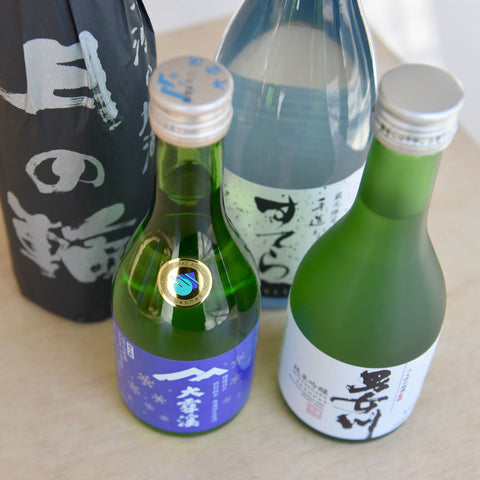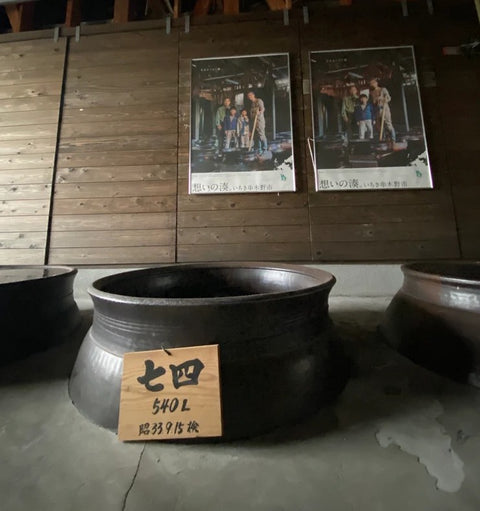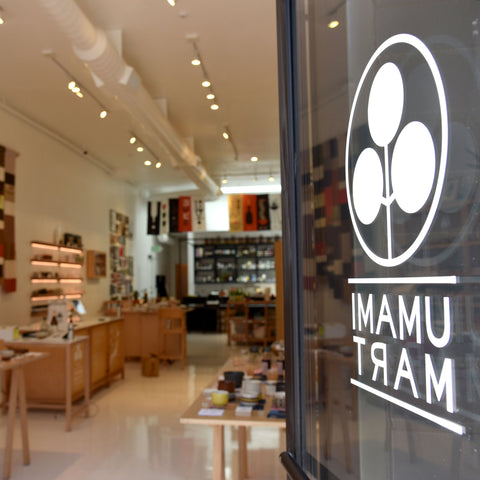
In September 2022, I had the pleasure of visiting a number of shochu distilleries in Kagoshima and Miyazaki. When I was in Kagoshima, Yamatozakura Shuzo's own Tekkan Wakamatsu took me around by car to three can't-miss handmade shochu distilleries.
The last leg of the day was to Ichikikushino, a small city on Kagoshima's west coast which is home to a ton of distilleries, but most notably Yamatozakura Shuzo and Shiraishi Shuzo, situated about 350 meters from each other (Google maps puts this at about four minutes walking time).
 Shiraishi's main brand, Tenguzakura, has been in circulation servicing local restaurants and liquor stores for many years, and as you can tell by this photo, is one of the pillars of this small city.
Shiraishi's main brand, Tenguzakura, has been in circulation servicing local restaurants and liquor stores for many years, and as you can tell by this photo, is one of the pillars of this small city.
 Shiraishi Shuzo's walls are adorned with a seemingly endless array of tengu masks.
Shiraishi Shuzo's walls are adorned with a seemingly endless array of tengu masks.

 Technically tengu.
Technically tengu.
 Awards and certificates adorn the walls in addition to - you guessed it - more tengu.
Awards and certificates adorn the walls in addition to - you guessed it - more tengu.
 Due to timing of the trip, I wasn't able to catch Shiraishi-san during production, so the majority of the kame (clay fermentation pots) sat empty, awaiting the next batch of raw materials.
Due to timing of the trip, I wasn't able to catch Shiraishi-san during production, so the majority of the kame (clay fermentation pots) sat empty, awaiting the next batch of raw materials.
 An empty handmade kame (clay fermentation pot). You can hear the ocean.
An empty handmade kame (clay fermentation pot). You can hear the ocean.
 A wooden still.
A wooden still.
 Shiraishi Shuzo's kojimuro (koji-making room). Black koji rice is visible in the tray on the floor.
Shiraishi Shuzo's kojimuro (koji-making room). Black koji rice is visible in the tray on the floor.

Shiraishi-san made a pot of puerh tea and explained to me his brewing and distillation philosophy. Shiraishi Shuzo is a small, very rustic handmade shochu distillery. In addition to the main Tenguzakura brand, Shiraishi-san makes tiny runs of small-batch imo shochu, all using 100% wild yeast fermentations and minimal filtration to highlight the unique terroir expressions of the potatoes and koji rice he's able to procure.
He works with local farmers, highlighting the farms and potato varieties – the choices he makes for fermenting and distilling change based entirely on the materials he gets. The kojimai (koji rice) he uses also changes depending on each farmer. In essence, he's trying to make a completely new shochu with each batch – and not everybody understands that concept! I definitely got the sense that there are two schools of thought – even under the umbrella of rustic handmade shochu, there are more old-school, conservative approaches to shochu-making, and the more experimental side. Like we saw with Yachiyoden, Shiraishi Shuzo does both. The former keeps the lights on and helps to carry on the tradition and legacy of the distillery, affording the brewer the ability to explore the artistic side of the latter.
 Shiraishi-san's labeling station. All done by hand.
Shiraishi-san's labeling station. All done by hand.
 A batch of labels for a Beniharuka (purple sweet potato) shochu. This shochu was undiluted and unfiltered. Insanely tropical and very oily.
A batch of labels for a Beniharuka (purple sweet potato) shochu. This shochu was undiluted and unfiltered. Insanely tropical and very oily.
 An ex-Laphroaig cask used for barrel-aging Tenguzakura Yaki Imo shochu. If you got to try this when we had it, you are lucky!
An ex-Laphroaig cask used for barrel-aging Tenguzakura Yaki Imo shochu. If you got to try this when we had it, you are lucky!
 A "taste" pour of the Yaki Imo. Very vegetal! I was getting celery and gobo.
A "taste" pour of the Yaki Imo. Very vegetal! I was getting celery and gobo.
 Shiraishi-san receiving an Umami Mart tote bag, and me receiving two bottles of small-batch imo shochu. If you made it to my suitcase event you may have gotten to try a sip or two of these!
Shiraishi-san receiving an Umami Mart tote bag, and me receiving two bottles of small-batch imo shochu. If you made it to my suitcase event you may have gotten to try a sip or two of these!
Being on the shochu side of this Japanese drinks business is so fascinating – the amount of shochu that makes it to the U.S. is about 1% of what is readily available and widely consumed throughout Japan. That makes every new expression, every shochu we haven't seen before a new discovery. Another small piece to a huge, seemingly unknowable puzzle.
When we got the opportunity to carry the Tenguzakura brand, we jumped at the chance. This shochu is made with the utmost care, passion, and obsession, so to be able to share even a sliver of these wild expressions with the ever-growing group of shochu lovers we're proud to call our customers is a privilege I don't take lightly.
I hope everyone gets a chance to experience these mind-bending shochus at some point, and we will try to provide them any chance we get. Be sure to grab Tenguzakura any time we have it, as we get them in very limited quantities.
Okay, well that is enough out of me for now. Thank you as always for reading, and enjoy shochu!
Kanpai,
Ian
 A happy camper
A happy camper




Comments (0)
There are no comments for this article. Be the first one to leave a message!